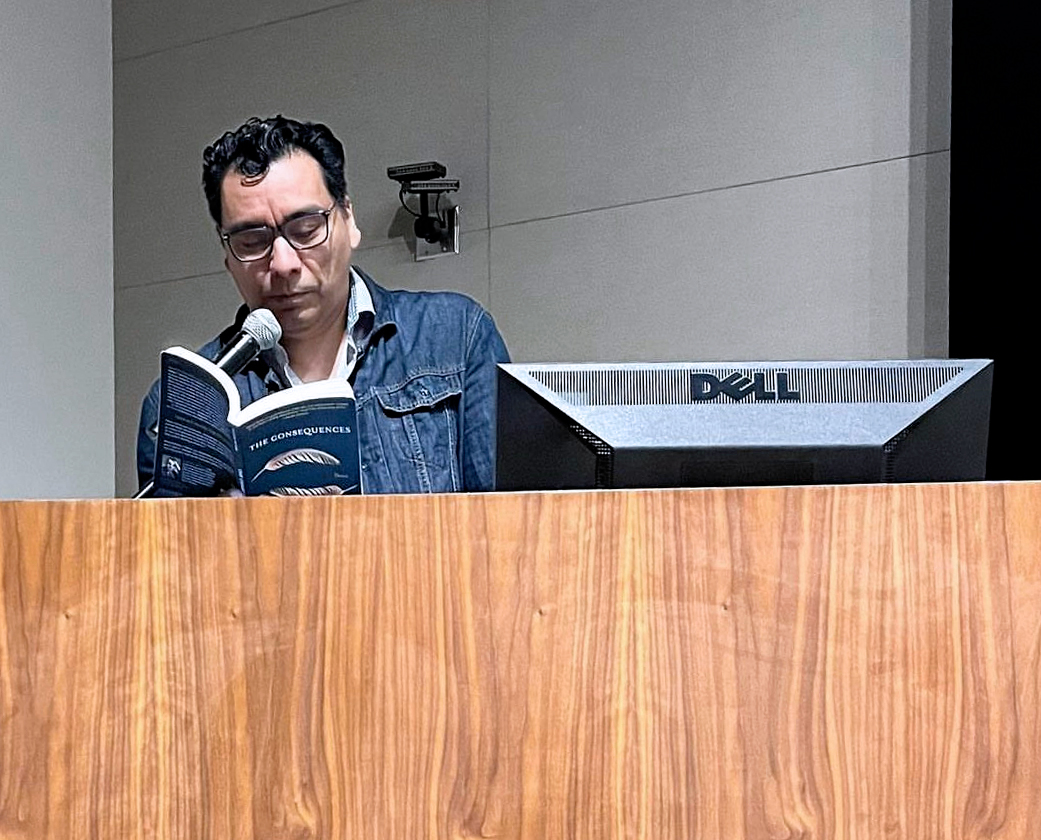In its first in-person rendition since the pandemic, the Tómas Rivera Conference returned to UCR’s campus with an array of authors that Endowed Chair, Alex Espinoza, introduced to writers and readers alike. In his opening introduction, Espinoza said, “I reached out to some colleagues and asked them, ‘Who would you like to be in conversation with?” The selected authors are Latinx,hailing from cities in the Central Valley to the boroughs of New York City, arriving with award-winning books and heartening words in tow.
The conference began with Texas native and Associate Professor at the University of Texas, Kimberly Garza, as she read select chapters from her debut novel, “The Last Karankawas.” The narrative takes on several perspectives to convey the power of community and place in the face of Hurricane Ike. The Karankawa people, as the protagonist, Carly, learns, are the ancestral foundation that tethers her family to their island off the Texas coast. Through many voices across chapters, Garza conveyed that the eye is not only found in the storm but in the people of Fish Village as Garza balances them all through her words.
Brooklyn screenwriter and author of her debut novel, “Olga Dies Dreaming,” Xochitl Gonzalez began her panel with her writing journey, having run a wedding planning company for ten years and explaining that protagonist, Olga, picks up her story from that same profession: a wedding planner for the uber-rich. In her reading, Gonzalez’s delivery of the prose built a constant momentum; with each winding thought from Olga, Gonzalez matches its breadth with a breakneck-speed reading. And as the story navigates several complexities in Olga’s life, a confrontation of familial truths and ties offers a careful examination of what we call “The American Dream.”
From Fresno, California, poet and winner of the Alta California Chapbook Prize, Gabriel Ibarra, joined the conference in a reading from his prize-winning collection, “On Display.” In each poem, an “artifact” as Ibarra described it, takes shape through specific objects: an aluminum baseball bat, a Homies figurine and a tattoo. “Poetry is moments of instance,” he conveyed to listeners, his navigation of memory not only serving to hold a moment in time but in a reader’s mind, enveloping them in the memory itself.
From writer and deputy public defender, Juanita E. Mantz (JEM) the chapbook, “Portrait of a Deputy Public Defender or how I became a punk rock lawyer” and memoir, “Tales of an Inland Empire Girl,” convey the personal tribulations and triumphs of JEM’s life, her punk rock teenage roots and childhood upbringing taking center stage. JEM explained that her writing came to be after the passing of her father. “I wanted to bring my Dad back to life,” she said, sharing memories of her past between readings, and the love and appreciation she held for her childhood was palpable; The stories of resilience became immortalized in the reader, inspiring each of us to consider how much life can change through JEM’s vulnerability and her kind words.
In a reading from American novelist Manuel Muñoz, the Mexican-American community of Fresno, California in the 1980s is explored in his latest collection of short stories, “The Consequences.” With a soft and composed voice, Muñoz delivers rhythmic and serene scenes through his prose, magnetic and rich in language.
When The Highlander asked Muñoz about how he manages a balance between repetition and lyricism, he explained, “I think it comes from reading poetry. […] Picking up the musicality of what a poem can do in a really short space helps avoid that problem [of redundancy].” Muñoz goes on to explain his daily ritual of reading a poem and examining its lines, the cross-genre practice making for beautiful expressions in his writing, capturing life at its core.
Melissa Lozada-Oliva, a Guatemalan-Colombian-American writer and poet, shares her novel in verse, “Dreaming of You” where a young poet brings Tejano singer, Selena, back to life.
Lozada-Oliva explained, “The book ends up not being about Selena–it’s more about me. Or about this mythical figure of Latinidad–not that Selena is a mythical figure–but Latinidad as a mythical figure.” Alongside her desire to create her art tastefully, Lozada-Oliva leaves the audience in constant awe through the various forms which her poems take on, allowing for an openness and conversation between the self and its vulnerabilities.
The conference’s finale ended with a conversation between “Love and Rockets” author, Jaime Hernandez, and UCR’s Associate Professor of Creative Writing, Michael Jayme. Hernandez, alongside his brothers Gilbert and Mario, has captured the intricate lives of women in the fictional town of Hoppers, preserving the punk scene of California on its pages in the forty years since the comic’s first issue. With panels from the comics projected on the screen, the black and white print of each story carries a vibrancy in its character expressions, its detailed wardrobes mixing rosaries and homemade tees, and its brevity of storytelling within its page space. And when the audience observes characters Maggie and Hopey giggling past a line of police officers, the joy and mischief of “Love and Rockets” are put on full display.
When The Highlander spoke to Espinoza over Zoom in January, it was to discuss the fears of starting a novel and how it lingers in the minds of writers even when they’re not writing. Espinoza had reassured me, saying, “Thinking about writing still counts as writing,” and after the conference, The Highlander asked him how the Tómas Rivera Conference might relate to that notion.
He told The Highlander, “It offers an opportunity for us to be in conversation with each other […] a space where we can all come together and share our experiences. [It] makes [the writing experience] feel less isolating.” He adds, “[Conferences] like these had a huge impact on me when I was an undergraduate pursuing my creative writing degree. These are the writers that I wanna be in conversation with. These are the works that I want my novel and my book to speak to.








